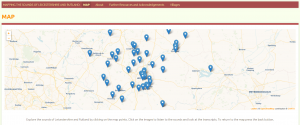In the summer of 2020, three Museum Studies students at the University of Leicester (Elizabeth Gray, Lillian Namyaalo and Maria Georgiadou) joined the Unlocking Our Sound Heritage team to create a sound map of Leicestershire & Rutland. In this blog, Elizabeth Gray reflects on the experience.
‘Sound is the vocabulary of nature,’ so said the French composer Pierre Schaeffer. This quote encapsulates the idea that sound has a constant presence in our lives, shaping the environment around us. This interpretation of sound connects to the notion of sound heritage and underpins the Mapping the Sounds of Leicestershire and Rutland Project.
In September the Mapping the Sounds of Leicestershire and Rutland resource was launched. This interactive sound map uses a mixture of oral histories, and natural and ambient sounds to explore some of the important places and events that have defined life in Leicestershire and Rutland over the years. The map includes material from several archival collections, including the East Midlands Oral History Archive, as well as recordings gathered especially for the project. The map hopes to develop a greater appreciation of sound by raising awareness of the role it plays in helping us understand our local environment. It also aims to highlight the existence of oral history collections and encourage greater public access and engagement with these.
A key element of the map is its inclusion of a wide spectrum of sounds. Not only does this showcase the diversity of sound, it also encourages reflection about what makes up our sound heritage. Heritage is a difficult concept to define due to its broad remit, but fundamentally it is a construct that is used to represent and reflect our identity, be it on a national, local or personal scale. Although Heritage can refer to physical buildings or objects, a large part of human existence revolves around the intangible. Traditions and behavioural practices shape how we see the world and these cannot be captured in their pure form. Instead alternative mediums such as writing or sound are used in an attempt to record and preserve these aspects. In this sense sound heritage is more than just a collection of music or interviews, rather it is a means of connecting the past to the present that reflects the multi-sensory way in which we experience the world. By including modern ambient sounds and archival recordings, the map presents both the past and present experiences of daily life in Leicestershire and Rutland. Combined together these sounds narrate the story of the local area over the years, a story that underpins how its heritage is perceived.
Heritage can become an object of contestation, reflecting the multitude of identities and experiences that humans have. In a project like this it is therefore important to try and represent as much of the area’s diversity as possibility. Unfortunately due to constraints of time and accessibility, particularly affected by the Covid-19 situation, in its initial launch form, the interactive map was unable to include all the different areas of the two counties, and inevitably does not represent all the diverse attitudes and personal heritage of their inhabitants. Restrictions meant that the project was heavily reliant on the contributions of external organisations. Although this had the benefit of enabling the team to establish connections with the wider community, it also posed limitations on the material that could be included. To counteract this, the map is being viewed as an ongoing project, giving the opportunity for more materials to be gathered to broaden the coverage and preserve more representations of the area’s heritage. In an ideal world everyone would be able to relate to at least one of the sounds included on the map, however, as with any attempt to document heritage, this will never be perfect. Nevertheless, the sounds we do have offer a glimpse of what can be preserved, raising awareness of the existence of sound heritage and hopefully encouraging the creation of new recordings for future generations to engage with.
Elizabeth Gray



 Subscribe to Colin Hyde's posts
Subscribe to Colin Hyde's posts
Recent Comments